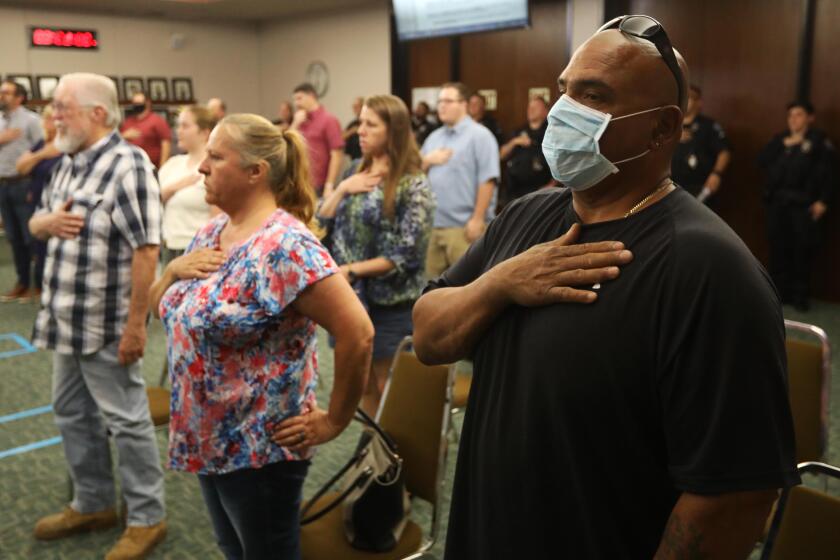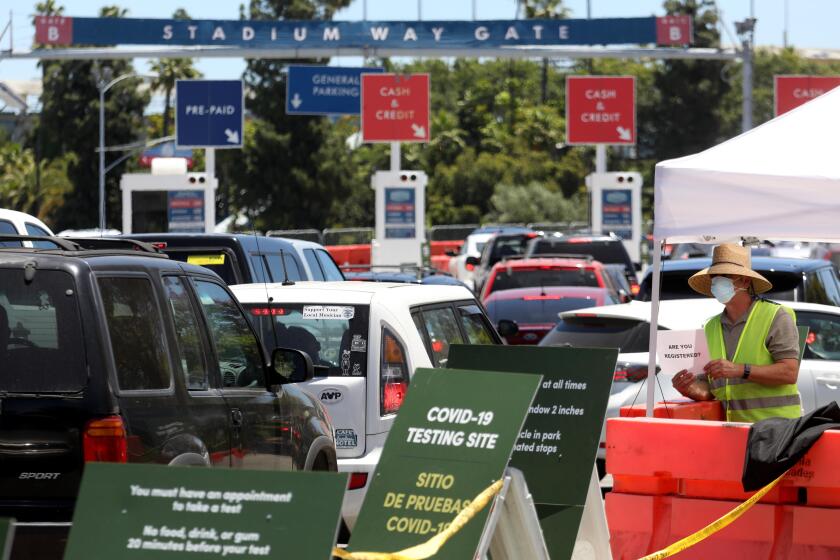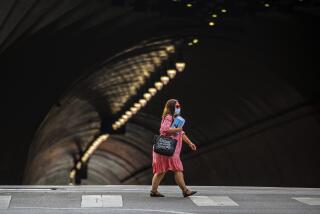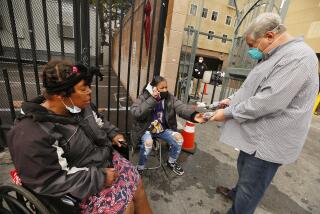Coronavirus transmissions keep rising in L.A. County, bringing new dangers for hospitals

- Share via
Coronavirus transmission continues to worsen in Los Angeles County, officials said this week, and that brings risks as the region further reopens.
With higher transmissions, there is a chance that the nation’s most populous county could run out of intensive care unit beds in two to four weeks, officials said Wednesday. The numbers have not reached danger levels yet, but health officials said they are monitoring conditions carefully for any signs of new pressures on hospitals.
The situation comes as L.A. County officials moved forward with plans to reopen broad sectors of the economy beginning Friday, including gyms; sports arenas without live audiences; movie, TV and music production; and hotels for leisure travel. Movie theaters and bars will remain closed in the county for now.
Experts are worried about the potential for new surges of disease as California reopens.
What’s going on?
Officials always expected an increase in the number of coronavirus cases as the strictest version of the stay-at-home order was gradually lifted.
The question now is whether the disease will cause the hospitalizations of a moderate number of people that the hospital system can handle, or if it will grow into a surge of severely ill patients who will overwhelm ICUs.
It’s too soon to say what will happen. Here’s a rundown of bits of the bad news and some good news in terms of where L.A. County stands amid the COVID-19 pandemic.
Coronavirus transmissions are up
There is even more evidence that the spread of the virus is rising, according to data released Wednesday.
Before the county began easing stay-at-home requirements last month, the effective transmission rate of the coronavirus was in a good spot: For every one person infected, that person on average infected fewer than one other person, said Dr. Christina Ghaly, L.A. County’s director of health services.
But on Friday, Ghaly disclosed publicly for the first time that the transmission rate is now greater than 1. She displayed a chart showing how the effective transmission rate, which was below 1 in April, began ticking upward, rising above 1 by the last week in May.
A little more than two weeks after L.A. County allowed many retail stores to open for pickup service, every one person infected with the virus had infected more than one other person, on average, according to the transmission rate.
“The model is now more certain that [the effective transmission rate] has increased again slightly, and is now greater than 1,” Ghaly said. “Because of this, the model predicts more firmly that the spread of COVID-19 in the Los Angeles County area is likely to increase gradually over time.”
As a result, a computer model used by L.A. County to estimate future demand on hospitals predicts there will be heavier use by coronavirus patients in the next two to four weeks, Ghaly said. Still, there should be sufficient hospital beds and ventilators to accommodate the increased demand, she said.
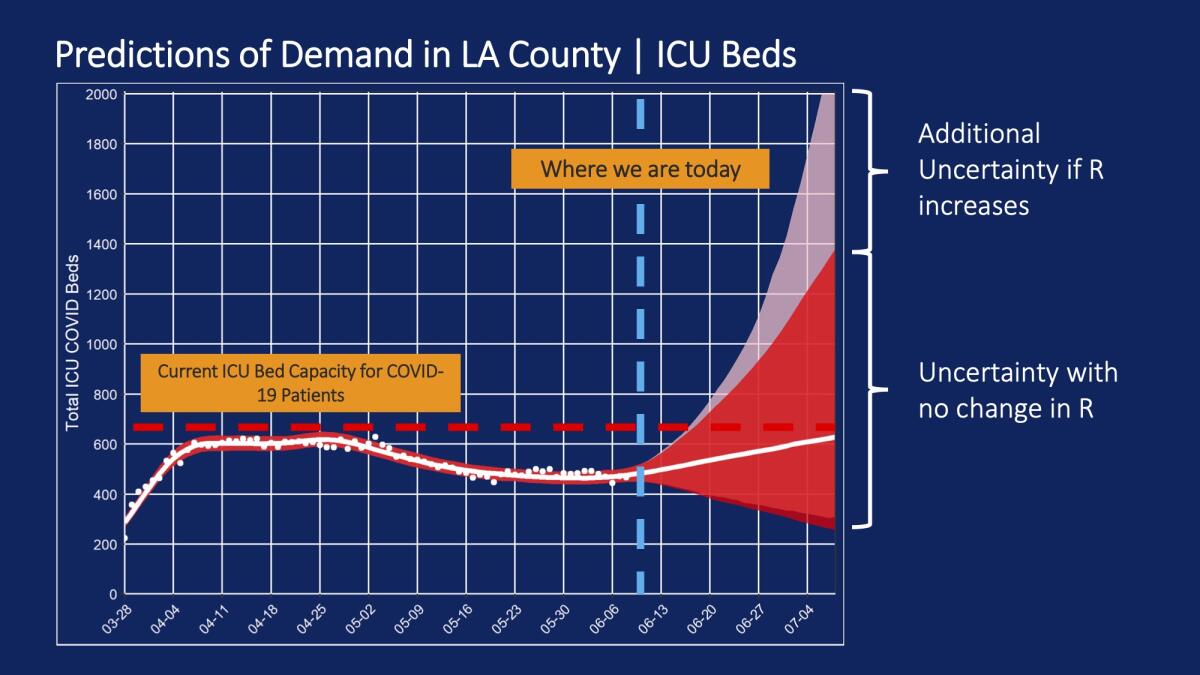
But it’s possible the county’s public and private hospitals could run out of ICU beds in the next two to four weeks, Ghaly said. Defending the reopening
At the same time, county health officials have defended their reopening plan. Authorities are still asking people to stay home as much as possible, but “there are good reasons why sometimes people need to or want to leave their home,” Ghaly said.
“Some people don’t have the privilege of being able to telework, and they have to leave their home to work. Many people wish to lend their voice in the fight for justice that is going on around all of us,” Ghaly said. “The key to controlling the virus does not have to mean remaining at home.”
The bulk of California’s cases are still in Los Angeles County, where officials reported 61 additional COVID-19-related deaths and 1,275 new cases on Wednesday.
Instead, physically distancing and wearing a mask at all times when you’re outside of the home and around others who aren’t part of your household are paramount, Ghaly said. Washing hands, cleaning high-touch surfaces and avoiding touching surfaces in general are also important, and staying at home when sick is too.
“It’s a little bit like walking on a tightrope: We do feel confident that if sectors open, adhering to the protocols, it can be done with a lot of safety,” said Barbara Ferrer, director of public health for L.A. County. “If sectors don’t adhere to the protocols, there’s a lot of risk.”
Ferrer said it was important for businesses to get back to work if it can be done in a safer way.
“We’re desperate to make sure that people can get back to their jobs,” Ferrer said. “And we just need to do it in a way that adheres to a lot of modifications, so it can be done as safely as possible.”
Ferrer also pointed out that the positivity rate among coronavirus tests is declining, with the cumulative rate now below 8%.
At the moment, there is no sign of a dramatic increase in hospitalizations in L.A. County’s hospitals, officials said. Hospitalizations had been declining weekly in L.A. County, but were flat last week compared with the previous week.
More to Read
Sign up for Essential California
The most important California stories and recommendations in your inbox every morning.
You may occasionally receive promotional content from the Los Angeles Times.
